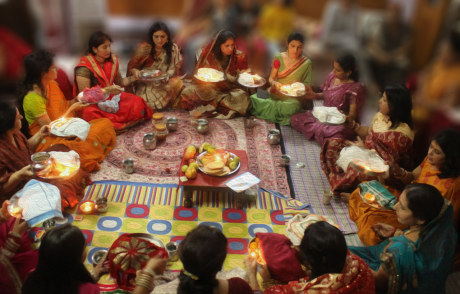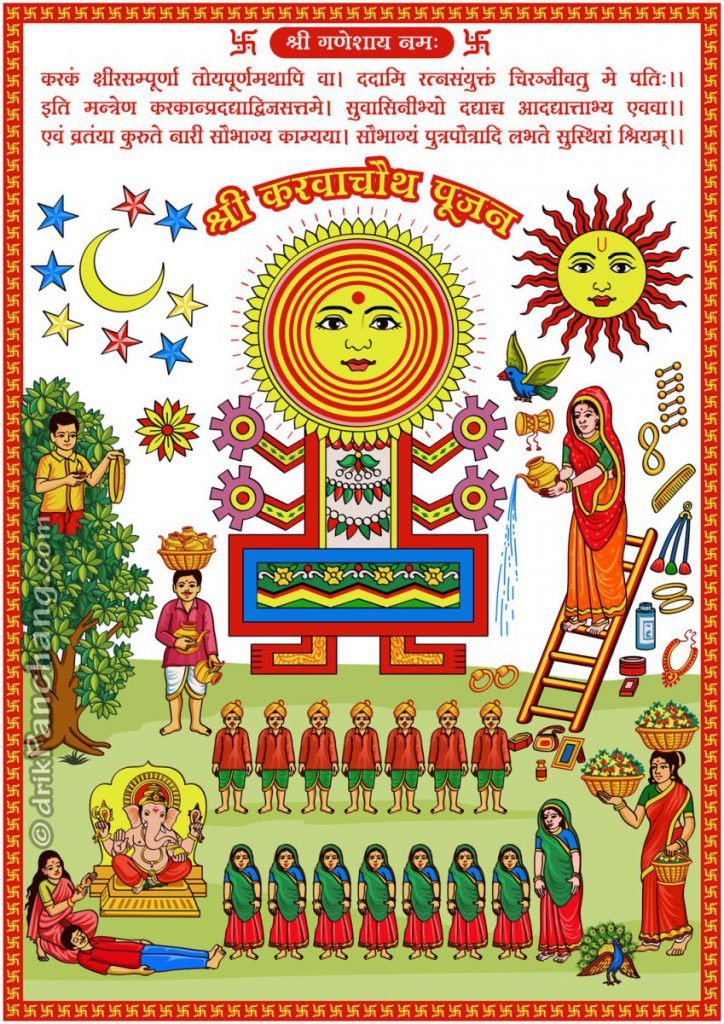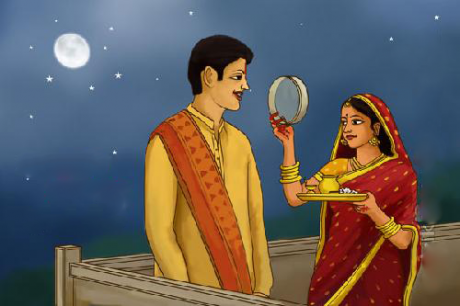Happy Dhanteras
Dhanteras also known as the festival of...
In Hindu Dharma, the goal of life is Self-realization or the attainment of God and all Hindus fast have a deep spiritual and religious significance. According to Hindu scriptures, fasting helps create an attachment with the God by establishing a harmonious relationship between the body and the soul. This is thought to be imperative for the well being of a human being as it nourishes both his/her physical and spiritual demands.
 Karwa Chauth
Karwa ChauthKarwa Chauth is one festival/ritual among the many celebrated in the North and North Eastern parts of India. This festival comes 9 days before Diwali on ‘Kartik ki Chauth’, i.e., on the fourth day of the new moon immediately after Dusshera, in the month of ‘Karthik‘ (October-November).
The term Karwa means a lamp and also an earthen pot with a spout. Chauth means the fourth day of Krishna Paksh in the month of Karthik. It is observed by married Hindu women seeking the long life, well-being and prosperity of their husbands. Married women keep a strict fast and do not take even a drop of water after sunrise. It is the most important and difficult fast observed by married Hindu women. It begins before sunrise and ends only after offering prayers and worshiping the moon at night.
Married women wake up to eat and drink in the wee hours of the morning of Karwa Chauth fast. Women keep a fast for the entire day which is spent making preparations for the rituals observed in the evening.

At dusk, women from neighboring, dressed in their best of their attires, gather together for the rituals, a part of which is listening to the legend and the significance of the fast. Shiva, Parvati and their son Kartikeya are worshiped on this day along with the 10 ‘karwas’ (earthen pots) filled with sweets. The Karwas are given to daughters and sisters along with gifts.
The fast is then broken in the night after the moon is sighted. It is usually the husband who gives the first sip of water and the first morsel of food. Women also exchange painted clay pots with bangles, ribbons, a small piece of cloth, sweets etc.
 There are many legends associated with Karwa Chauth fast. Queen Veervati who was observing the Karwa Chauth fast, was tricked by her seven affectionate brothers who were pained by the arduous efforts taken by the sister for her husband’s longevity. The brothers made a mirror on a pipal tree which gave an impression that the moon had risen. Veervati broke the fast mistaking it for moonlight, as the fast is intended to end with the rising of the moon. The moment she sipped a little water, news arrived that her husband was dead. However a Goddess who took pity on her, revealed her brothers’ intentions and directed her to observe the fast again which revived her husband.
There are many legends associated with Karwa Chauth fast. Queen Veervati who was observing the Karwa Chauth fast, was tricked by her seven affectionate brothers who were pained by the arduous efforts taken by the sister for her husband’s longevity. The brothers made a mirror on a pipal tree which gave an impression that the moon had risen. Veervati broke the fast mistaking it for moonlight, as the fast is intended to end with the rising of the moon. The moment she sipped a little water, news arrived that her husband was dead. However a Goddess who took pity on her, revealed her brothers’ intentions and directed her to observe the fast again which revived her husband.
A variant of the story also has it that her brothers made a huge fire behind a mountain whose light, Veervati mistook for the moonlight and broke her fast. Soon the news arrived that her husband was dead and while she hurried in grief to her husband’s house, Lord Shiva and Parvati intercepted, and Goddess Parvati cut her little finger and instructed Veervati to sprinkle it over her dead husband, also warning her to observe the fast strictly henceforth.
The legend and significance of Karwa Chauth fast also has a mention in the Mahabharata. The Pandavas once faced a lot of ordeals with the absence of Arjuna while engaged in penance in the Nilgris. The despaired Draupati prayed to Lord Krishna who reminded her of the significance of the fast of which Shiva had described to Parvati before. It is said that Draupati observed the fast and things fell into place.
The story of Karwa, a devout wife whose husband was about to encounter death in the jaws of a crocodile is also an important legend associated with Karwa Chauth fast. The impeccable love and devotion that she had for her husband empowered her to bind the crocodile with a cotton yard and demanded Yama, the Lord of death to banish it to hell or ‘narak’. The frightened Yama complied with her demand fearing her prowess owing to being a devout wife.
 As all rituals portray an underlying essence, Karwa Chauth also boasts of a lofty truth. A devout wife is the strength of the family. Her attitude serves as a harmonious cord that binds her husband and family as an integrated whole. Furthermore it adds in the purity of one’s mind required for spiritual pursuits in her after years. A pure mind is integrated and potent. The one pointed attitude of the mind, here devoutness for the husband, holds the relationship in a firm binding. The legend and significance of the fast are still observed even today, holding on to the cultural aspect of the country. Hence it can be concluded that Karwa Chauth originated in ancient India, as an attempt to enhance marital bonding and keep one’s family intact which contributes in its own way for societal harmony as well.
As all rituals portray an underlying essence, Karwa Chauth also boasts of a lofty truth. A devout wife is the strength of the family. Her attitude serves as a harmonious cord that binds her husband and family as an integrated whole. Furthermore it adds in the purity of one’s mind required for spiritual pursuits in her after years. A pure mind is integrated and potent. The one pointed attitude of the mind, here devoutness for the husband, holds the relationship in a firm binding. The legend and significance of the fast are still observed even today, holding on to the cultural aspect of the country. Hence it can be concluded that Karwa Chauth originated in ancient India, as an attempt to enhance marital bonding and keep one’s family intact which contributes in its own way for societal harmony as well.
The ancient Indian medical system of Ayurveda sees the basic cause of many diseases as the accumulation of toxic materials in the digestive system. Regular cleansing of toxic materials keeps one healthy. By fasting, the digestive organs get rest and all body mechanisms are cleansed and corrected. A complete fast is good for health, and the occasional intake of warm lemon juice during the period of fasting prevents the flatulence.
Gurubhagwan ke anant shukrane hain. Hamare sampooran vriddhi ke liye aap sadev hamare saath hain. Hamen to apni baat bhi theek se kahni nahi aati. perantu aapka prem v guidance hamen dheere dheere sab sikha dega eisa hamen vishwas hai. bus bhagwanji aap sada saath rahen. radhey radhey bhagwanji.
Anant Anant shukrane bhagwanji
sadguru bhagwan ke anant anant shukrane.hamari dharmik n samajik paramparaon ke mool jo rehsay he guru bhagwan usko ujagar karte hein .
sukhrane ji.
Gurubhagwanji apke anant anant shukrane hain
Guru Bhagwan k anant anant shukrane,Hey Naath main apko kabhi bhuloo nhi…….
Gurubhagwan ke anant shukrane hain. Gurubhagwan hamen har festival ki mahima batate hai. Jisse ham har tyohar , bhagwad bhav se mana paate hain. Saare shukrane Gurubhagwan ke hain Jo har pal hamari sambhal kar rahen hain. Radhey radhey bhagwanji !
Anant anant shukrane hain mere Guru ke shukrane shukrane shukrane bhagwanji
Guru Bhagwan ke anant shukrane.Bhagwanji many thanks for giving us detailed knowledge about Karva Chauth fast.Radhe Radhe Bhagwan ji
Radhey Radhey Guru Bhagwan ji &Guru maa…aapke Anant Anant shukrane..har baat ka Har festival is sampoorna tatva guru bhagwan ji aap hi batate aur samjaate hai..tum be Miltey agar Satguru na jaane ham kahan jaate.. Anant Anant shukrane
Radhey Radhey Guru Bhagwanji v Guru Maa Aapke anant anant shukrane hai . Aapki itni karuna hai ki aap hame har tyohar ke goodh arth ko bata kar usse bhagvad bhav se manane ki prerna dete hai aur hame duniya je adambaron aur uske chakachoundh wale rang se bacha lete hain. Aapke shri charno me koti koti pranam hai aapke anant anant shukrane Bhagwanji!
Gurubhagwan ji k anant anant shukrane hain. Gurubhagwan ka prem aur karuna hai ki hame har tyohar ka arth samjhate hai aur hamara bhagwad bhav banate hai.
Guru’bhagwan ji k anant anant shukrane h